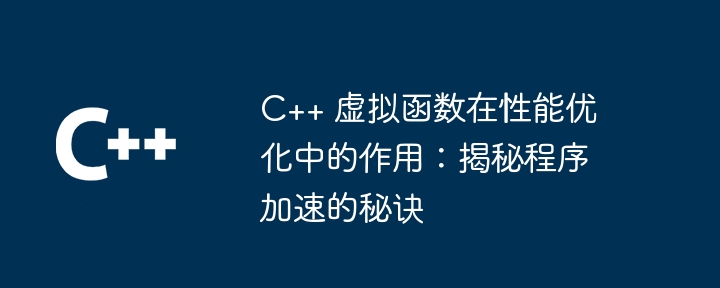
The role of virtual functions in performance optimization: Dynamic binding: supports polymorphism and allows parent class pointers to call subclass methods. Virtual function table (VMT): A table that stores the addresses of all class virtual functions, reducing extra runtime lookups. Performance improvement: The compiler uses VMT to optimize virtual function calls and reduce runtime overhead.

C The role of virtual functions in performance optimization: revealing the secret of program acceleration
Preface
In C programming, virtual functions are a powerful feature that allows derived classes to override functions of parent classes. In addition to their polymorphism benefits, virtual functions also play a crucial role in performance optimization.
Dynamic Binding
The main purpose of virtual functions is to support dynamic binding. Dynamic binding means that the actual function to be called is determined at runtime, depending on the runtime object type. This allows a parent class pointer to call child class methods, thus achieving polymorphism.
However, this dynamic nature comes with a certain runtime overhead because the compiler cannot determine the exact function to call at compile time.
Performance Optimization
To optimize the performance of virtual function calls, compilers often use a mechanism called a virtual function table (VMT). VMT is a table that stores the addresses of all class virtual functions. When a virtual function is called, the compiler looks for the correct VMT entry and jumps to the corresponding function.
By using VMT, the compiler can improve performance by avoiding extra lookups at runtime.
Practical case
The following is a code example that shows how to use virtual functions for performance optimization:
#include <iostream>
class Shape {
public:
virtual double area() const = 0;
};
class Circle : public Shape {
public:
explicit Circle(double radius) : m_radius(radius) {}
double area() const override {
return M_PI * m_radius * m_radius;
}
private:
double m_radius;
};
class Square : public Shape {
public:
explicit Square(double side) : m_side(side) {}
double area() const override {
return m_side * m_side;
}
private:
double m_side;
};
int main() {
Shape* shapes[] = {
new Circle(2.0),
new Square(3.0)
};
for (Shape* shape : shapes) {
std::cout << shape->area() << std::endl;
}
return 0;
}In this example, ## The #Shape class is an abstract base class, which contains a pure virtual function area(). The derived classes Circle and Square implement this function respectively. . When we call the area() function, the compiler uses VMT to quickly find the correct function implementation.
Conclusion
Virtual functions are crucial in C program performance optimization. By taking advantage of dynamic binding and virtual function tables, the compiler can optimize virtual function calls and reduce runtime overhead. When designing object-oriented programs, it is crucial to understand the performance impact of virtual functions in order to achieve the best balance between performance and flexibility.The above is the detailed content of The role of C++ virtual functions in performance optimization: revealing the secret of program acceleration. For more information, please follow other related articles on the PHP Chinese website!
 What are the differences between c++ and c language
What are the differences between c++ and c language
 Recommended learning order for c++ and python
Recommended learning order for c++ and python
 Cost-effectiveness analysis of learning python and c++
Cost-effectiveness analysis of learning python and c++
 Is c language the same as c++?
Is c language the same as c++?
 Which is better to learn first, c language or c++?
Which is better to learn first, c language or c++?
 The difference and connection between c language and c++
The difference and connection between c language and c++
 C++ software Chinese change tutorial
C++ software Chinese change tutorial
 Cost-effectiveness analysis of learning python, java and c++
Cost-effectiveness analysis of learning python, java and c++




